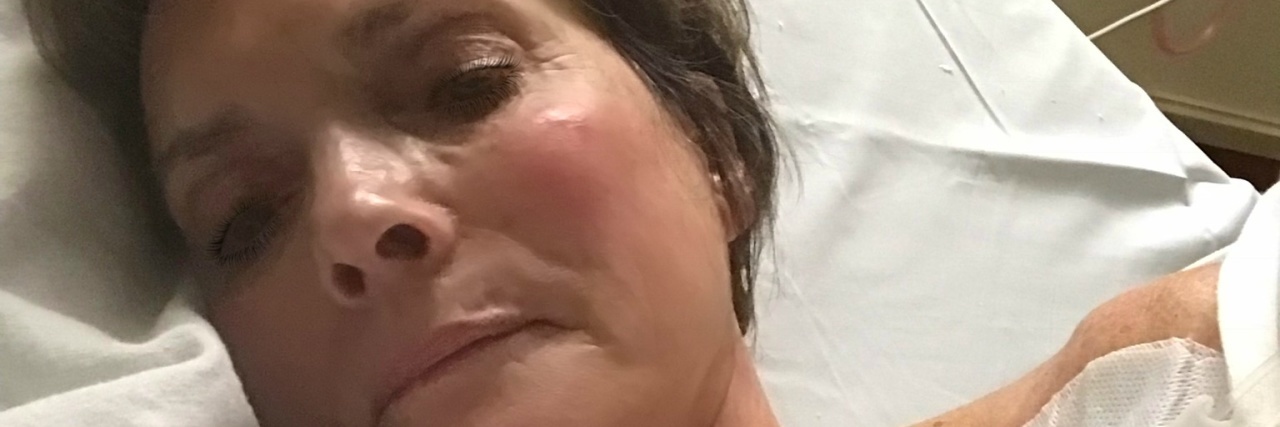Having lived all of my adult years with Crohn’s disease and ulcerative colitis, I have grown a new kind of compassion and empathy for other people who are living with invisible illnesses.
When one is struggling with an invisible illness, I realize that one of the greatest gifts I can give is compassion and understanding. Whether it be from depression and pain from loss, cancer, fibromyalgia, chronic pain or fatigue, basically anything that affects your body or your mind in a negative way, I get it. I’ve been there. I know how it feels on the inside. I know that old grind very well.
My sister is struggling with an invisible illness. She’s my older sister who is always been my idol. I can now communicate with her in a way that we never could before. I can show her a different kind of empathy and have a vastly different conversation with her. Not that I’m not a compassionate person, it’s just that this compassion feels very real, a nonsense kinda thing. Not the movie star, in movies kind of compassion and empathy, but the real down dirty kind of empathy. The kind that says, “I’ll go into the cave with you and just sit, if that’s what you wan./”
I don’t like that I’ve had to go through what I’ve gone through and am still battling at the age of 60. I was diagnosed with Crohn’s at the age of 14, then sarcoidosis, and the latest, ulcerative colitis. I can assure you it’s not been a dreamy road.
I try to figure out what I can give to others with the little I have. When I’m feeling my worst and I’m in so much pain, the kind of pain that all I wanna do is find a hole in the earth and crawl in, I think about others who are struggling as well. Whose lives maybe I can reach out and touch. I write my story with that in mind hoping that my words will telescope out to others and give them silent, gentle hugs, silent knowing words that hopefully send a message that everything is going to be OK.
When somebody else knows how I feel from the inside out, it’s oddly comforting. I feel connected. But no platitudes, please. I am definitely not one for platitudes. When people say things like, “When life gives you lemons, make lemonade!” all I want to do is punch them in the throat. What they don’t get is that I would give my eyeteeth to be outside, doing life instead of being again stuck in bed with that twisty kind of pain that makes you want to do your own surgery.
By talking to someone else, I pray that by lending them an ear or a shoulder to vent on, they’ll maybe feel more human than just a walking ball of string that’s constantly unraveling. Talking to someone else helps me get through my pain, frustration and my sadness at having to live with a chronic illness. Writing gives me a sense of purpose and hope – which is so important for those of us that are disabled and for those who are stuck at home all the time.
I used to be a real go-getter. I was up early in the morning, in a great happy mood, raring to embrace the day. Now, I wake up and calculate exactly how many spoons I’m going to have today. I think of what I can accomplish, from fixing something to eat, cleaning up, to showering. I live very different kind of mornings, that frankly sometimes I really hate.
When I talk to a friend who has an invisible illness who tells me, “I just can’t get out of bed today, my kitchen is a massive mess and my laundry is starting to move,” I get it. There is no shame coming from me, only love and knowing because I’ve been there.
When you ask someone who battles with an invisible illness a question, be prepared to repeat your question. Many of us who are struggling with an invisible illness for most of our lives or long-term have created fortresslike coping strategies. Personally, I do not want the pity vote. We’ve had to learn how to keep the emotional hurt out, but we also have to learn how to let the love and care in. We all desperately want to be part of something bigger than us…to have connection, to be touched in a non-medical way. No rubber gloves, no poking your very sore belly, no cold stethoscope on your chest…but instead a quiet touch, a hand to hold. A shared smile.
It is also important not to push someone into talking about what’s happening to them. It’s new and way scary. Listen for their cues, some subtle, some right out loud. And that’s OK too. We are all allowed the grace to cope the best we can for today. Tomorrow is so uncertain, only today, only this minute counts. Go find your empathy and compassion so that next time you’re bluer than an over ripe blueberry, talk to someone or post in your support group. I promise, in a small miracle kinda way, it helps.

